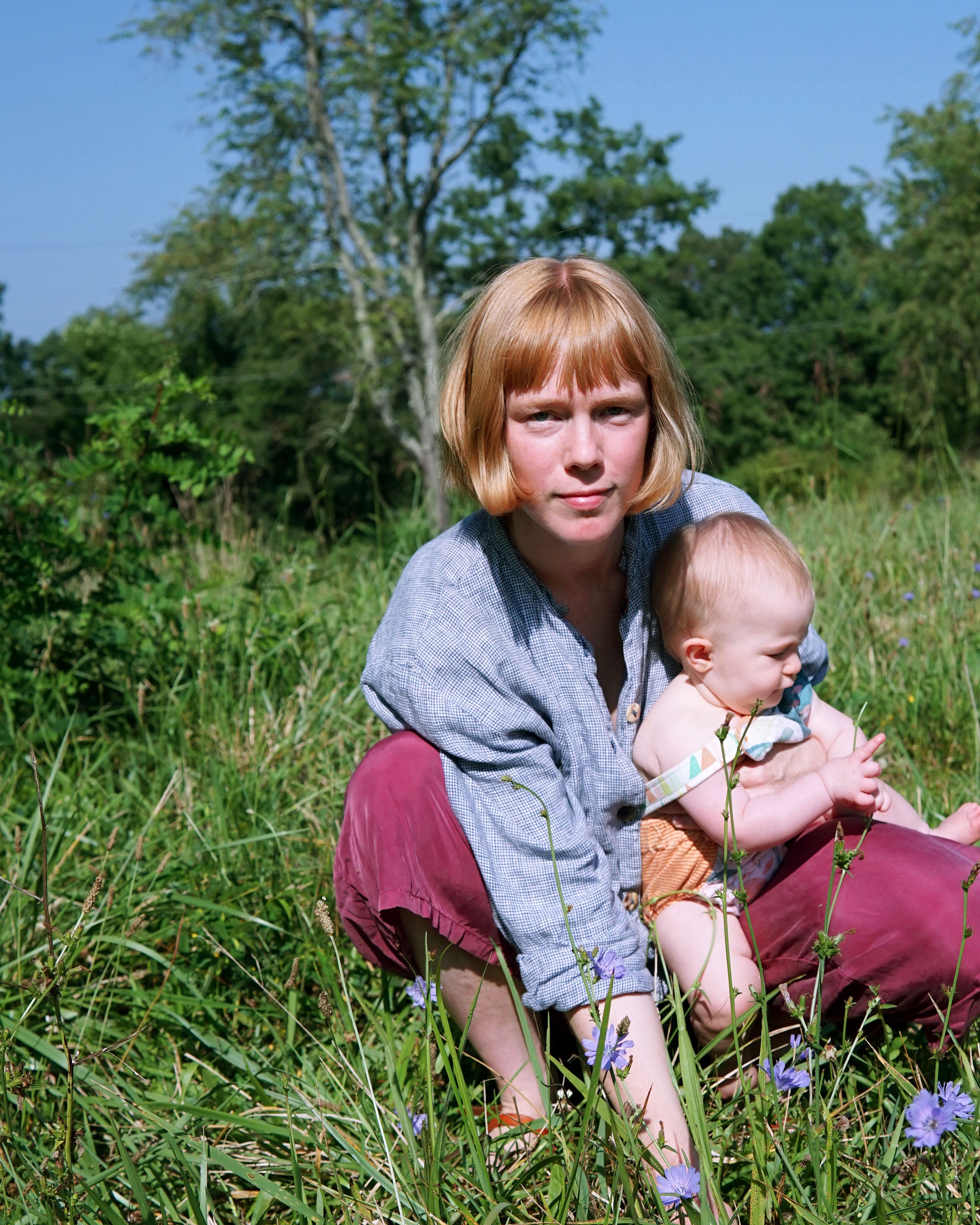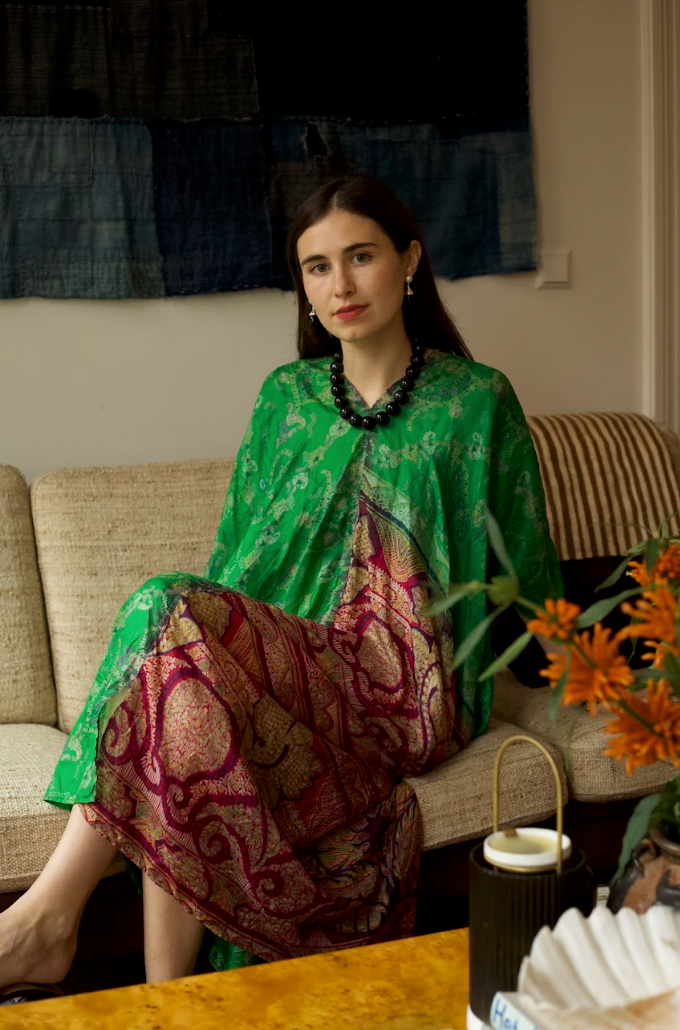A New Look at Heilbron Herbs

A brand refresh for Heilbron Herbs plus an insightful conversation with Founder Saralyn Bellmer, including a deep look into skin health, inside and out.
Saralyn is an herbalist, lifetime lover of plants, and the founder behind Heilbron Herbs, a brand that makes tinctures, teas, and natural skincare in Western North Carolina. Drawing upon thousands of years of knowledge compiled by healers around the world, coupled with the findings of science, Heilbron Herbs offers beautiful, contemporary products that amplify the body’s own ability to be radiant and well.
I love the story you tell about your mom noticing you at 6 months old sitting in the grass quietly rubbing plantain leaf on your eczema, later to find out that plantain is a primary skin-healing herb. What is your personal approach to plants now, as an adult and herbalist?
I have a somewhat multifaceted approach - I do have a very organic, intuitive relationship with plants and that deeply informs my work with them on a daily basis. I’ve been lucky to spend a lot of time around herbs in their living form: in gardens, farms, in the woods, growing them myself. Getting to know the plants through their lifecycle really adds a whole layer of understanding, like any relationship.
Yet as a professional herbalist and someone who values evidence-based information, I draw upon traditional knowledge of plants across various lineages of herbalism from around the world, coupled with the findings of science, which has validated many of the ways humans have been using plants for hundreds or thousands of years. So maybe the initial spark of inspiration is intuitive but then I’ll really dive into books and studies whenever I’m writing or formulating.
How do you utilize plants in your day-to-day? Do you have a handful that are used everyday, almost like non-negotiables? Or perhaps you’re not that ‘strict’?
I’m not really married to any herbs long term, though I do find that I continue to come back to some over and over again, like Milky Oats. I would say I go through eras when I lean more on certain plants or formulas depending on what’s going on in my body, life, or seasonally - for three months, six months, or a year or so. I am really passionate about using herbs for stress relief and nervous system regulation - we know that stress is one of the primary factors in so many of the common chronic diseases of our time and herbs can be really helpful in supporting the body balance and de-escalate its stress response. I think about this a lot, so naturally many the herbs I keep coming back to are in this group! I keep tinctures for different purposes in every corner of my house/car/bag.
Our skincare essentials - Deodorant, Face Oil, Face Mist and Body Oil - are always a part of my routine in the morning, evening and whenever else I need it. They feel luxurious and effective and it also takes me a total of one minute to apply all four - maybe less - if I want it to be that simple!

What is something you wish for others to know when they pick up your Face Mist or Deodorant in their hands and are looking at the ingredients versus a Face Mist or Deodorant from a big box retailer?
I think just starting there - checking the ingredients is a great practice. In the beauty industry in particular, we are used to ignoring the ingredient list because almost always there are unrecognizable words - so what’s the point of looking if we can’t understand it, right?! It’s pretty easy to look things up these days, and in general if a product has a long, long list of unrecognizables, that might be a bit of a red flag. At Heilbron, because our formulations are deeply informed by traditional herbalism, we use whole ingredients, like literal plants, which are then processed in specific but very low-tech ways to utilize their benefits: via dehydration, or steeping them in alcohol or oil, or through distillation. We all know the concept of whole foods and how eating fresh, varied, unprocessed ingredients benefits our bodies: Why are highly processed, isolated, or synthetic ingredients still the holy grail in beauty? Our skin is just another organ in our body - the biggest one actually - and is highly permeable. Everything we put on our skin ends up in our bloodstream, liver, affects our hormones, brain - our whole body.
Let’s take a deeper look at the ingredients that go into your products. Why is it so important to source all of your botanicals directly from the people that grow them?
It’s honestly just the most transparent way I can source the best of the best. By having direct contact with our producers, I know exactly who is growing our ingredients, what their practices are like, and how fresh everything is. I get to be the second touchpoint for anything that goes into our products and I can personally vouch for the quality because I touched, smelled and tasted it before it was processed.

You’re right that, first and foremost, what we see on the surface are signs of what’s happening internally. Every body is different but because the skin is an organ of elimination, the main places to pay attention are digestion, liver support, and hormone balance. If digestion isn’t optimal, if the liver is congested, or if our hormones aren’t getting metabolized and eliminated, our skin is going to pick up that load. Moving the body and sweating regularly is also essential for improved circulation, tone, and to flush congestion through those channels of elimination.
After prioritizing fresh, unprocessed foods, drinking water, and eating lots of healthy fats, I think the easiest and best way to improve digestion, liver function, and balance hormones naturally is to incorporate digestive bitters into mealtime. One of my herbalism mentors has this saying that everything is better with bitters and it’s really kind of true. And then for people who want to go deeper or need personalized care for a specific skin condition, I suggest a consult with someone trained in clinical herbalism and holistic dermatology like my friend Allison Mahoney!
And what about topically?
Simplify! Cleanse as little and as gently as possible - and only when makeup, sunscreen, and dirt need to be removed. So much of the skincare education most of us received in our teens is contrary to our skin’s intrinsic ability to care for itself. Again, if we think of our skin as an organ, rather than a surface, it’s easier to shift our focus away from changing it: stripping, scrubbing, polishing, and covering with product and makeup. When we understand that the skin is a whole body system that knows how to function optimally if we let it, then we can support it to do its job, which is quite literally to be a barrier between the outside world and the rest of our body. The appearance of our skin is a reflection of its ability to function well.
The topicals we use should be able to support the skin’s barrier function and nourish and feed the skin from the outside-in. At minimum, our skin needs two things topically: water to stay plump and hydrated, and oil to stay moisturized and maintain a healthy barrier. Ideally, anything we put on our skin also provides nutrients and supports its optimal health. The plant kingdom offers us a beautiful library of skin healing compounds, whether we are looking for support with signs of aging, acne, eczema, rosacea or any other skin complaint.
All of this brings us to your Face Oil which is just a standout in your skincare lineup. With whole-plant extracts of Japanese knotweed, calendula, yarrow, plantain, chamomile, lavender, and marshmallow tops, the color and scent is so green! Can you talk about the difference between using whole-plant extracts versus essential oils (like lavender essential oil a lot of us are used to seeing)? What does that look like?
Yes, this is an important point! Essential oils are very concentrated extracts containing the isolated volatile oils of a plant. They 1) only contain one piece of the pie as far as beneficial compounds go, 2) can be so strong that they are irritating, cause allergic reactions, or compromise the skin’s barrier function, and 3) are fairly inefficient to produce because it takes a lot of plant material to make a small amount of essential oil. So from a sustainability perspective essential oils can be quite precarious - a whole conversation we can have another time! Essential oils are largely valued for their ability to concentrate scent and as long as one can physically tolerate them I don’t think we have to avoid them altogether. Yet, we do need to be cautious with our use of them and for the most part I don’t think they’re great to use as therapeutic topicals.
What we do instead at Heilbron is really very simple, and it’s informed by thousands of years of traditional herbalism from around the world: We make medicated oils by steeping the plant material into cold pressed oils of the highest quality for a couple months. When we infuse a plant into an oil, we get all of the oil soluble compounds, not just the ones that evaporate easily (like essential oils). In this way, whole-plant extracts are much more gentle, broader spectrum expressions of a plant. Industry constantly tries to isolate beneficial plant compounds but we often see that the whole spectrum of compounds in a plant work synergistically - and balance each other out so we don’t have as many side effects. An example of this that comes to mind is curcumin, a compound in turmeric highly valued for inflammatory support. Isolated curcumin is very difficult for the body to absorb, but ironically has been found to be more bio-available when taken with the rest of the compounds found in… turmeric! Likewise, many people with sensitive skin will have an allergic reaction to lavender essential oil but when used as a whole plant extract lavender can be very soothing for even the most sensitive skin.

We started our questions today about your mom noticing your plant curiosity as a baby. Now you’re a mom with a baby, baby Ursa! What are your go-to gentle herbs for kids? Can you tell if Ursa has any favorites yet?
Chamomile, lemon balm, and catnip are the classic three herbs for babies, but there are lots of gentle herbs like elderberry, passionflower, milky oats, and marshmallow root that are great for children. It’s hard to say yet if Ursa favors any particular herbs yet but she does like to drink herbal tea in the mornings with us, asks for Sleep Tincture in water before bed some nights, and absolutely loves putting the Face Oil on after a shower - it has plantain in it and we rub it on her eczema just like I did as a baby!
Discover Heilbron Herbs at Covet + Lou. More from Saralyn here.



